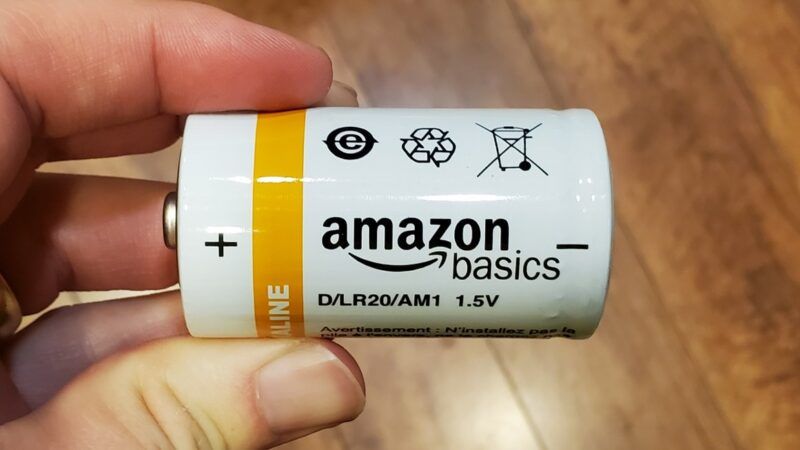Anti-Amazon Congressman Appears Unfamiliar with the Concept of Store Brands
Amazon promotes products that mimic its competition? Welcome to more than a century of American retail practices.

House Antitrust Subcommittee Chairman David Cicilline (D–R.I.) has issued a series of tweets accusing Amazon of predatory behavior for creating its own version of the products it sells:
Imagine if you ran a store and knew exactly which products would sell best. Rather than competing on the merits, you just copy those products, down to the smallest detail.
Now imagine you place the original on the next aisle, on the highest shelf, out of view. You can't lose.
— David Cicilline (@davidcicilline) October 19, 2021
Several major retailers do, in fact, create cheaper store-branded or generic versions of the products they sell. Go to CVS, and you'll see store versions of everything from over-the-counter painkillers to vitamins. Countless supermarket chains have their own versions of well-known sodas. Not long after Cicilline's tweets appeared, tech writer Ben Evans tweeted a list of major retail chains in America and what percent of their revenue comes from their own private brands.
Americans spend close to $160 billion annually on private label goods. And Amazon's private-label footprint is actually pretty small. The company gets less than 2 percent of its revenue from its private label products, compared to the double-digit percentages at other major retailers.
But once search algorithms get involved, people with agendas start suggesting that tech is being used to manipulate our choices. Amazon isn't simply accused here of copying other companies' products and then undercutting their prices, something most retailers already do. It's accused of hiding other companies' products through its search engine and giving priority to its own stuff, depriving consumers of their choices.
Reuters recently reported, based on internal documents, that Amazon was copying products and rigging search results in India as it attempted to grow its market there. Amazon denies the accusations. The story paints all of this with a sinister brush, suggesting that Amazon is "exploiting" other brands by learning how they make their products and then making its own version.
India's cronyist government heavily favors Amazon's competitors and tips the scales against the company. This isn't America: In 2019, half of India's citizens reported having to bribe a government official in the past year. But here's how Reuters frames India's harsh domestic economic protectionism: "Concerned that predatory pricing could hurt these merchants, India prohibits foreign e-commerce players from selling most goods directly to consumers, as they do in many other countries." Only later in the story are you told that the merchants being hurt are India's wealthiest and most powerful citizens, not the average Indian consumer.
In any event, it should be trivially easy to determine whether Amazon is favoring its own brands by simply searching the site for products and determine if, as suggested, Amazon is trying to hide competitors on its site.
Amazon sells its own trash bags under the brand name Solimo. I did a simple search on Amazon of "trash bags." The top of the page is dominated by brand leader Glad (which probably pays for its placement, which is not unusual and also happens in retail stores). Solimo does appear as a top match with the tag "Best Seller," but the page is absolutely littered with alternative options, including Hefty and a few other brands I had never even heard of.
Next I searched for "bath towels," also available as an Amazon Basics brand. Again, though Amazon Basics shows up as one of the first options, many other brands are represented in the search results. If anything, I'm actually seeing more and different brands of bath towels than I'd find in the average retail store.
That's what should be the point when we talk about "monopolies" in big tech platform. Antitrust is supposed to be about protecting consumers from predatory practices, not punishing successful businesses for doing the same competitive practices that brick-and-mortar stores have been doing for more than a century.
The purpose of Cicilline's Twitter thread was to promote a terrible cronyist bill called the American Choice and Innovation Online Act. Despite the name, the legislation would do much more to smother choice and innovation than to foster them. It would ban online commercial platforms from any practice that "advantages" its own products over those of other businesses. It is essentially an attempt to turn Amazon into a commercial version of a "common carrier," forced to suppress its own competitiveness because it's just too good at it.
Remarkably, the bill would prohibit a platform from using its business information to produce products or services that mimic what its other vendors are making. But it only applies to online platforms like Amazon, not to brick-and-mortar retailers, even though—just to reiterate—many major physical retail chains also engage in this behavior.
Right now the bill has just 20 co-sponsors. Let's hope that list does not grow. This isn't about keeping competition alive; it's about protecting preferred businesses from competition.
This post has been corrected to reflect that Cicilline represents Rhode Island in Congress.


Show Comments (34)